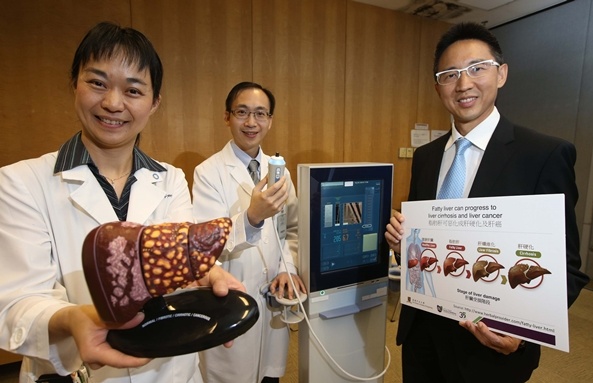
The Chinese University of Hong Kong (CUHK) has conducted the world’s largest study that examines the prevalence and progression of non-alcoholic fatty liver disease (NAFLD) in diabetic patients, in order to determine whether screening should be recommended. Among the 1,918 diabetic patients participating in the study, 73% were found to have fatty liver and nearly 1 out of 5 has severe liver fibrosis or cirrhosis. The liver team therefore recommends screening for early stage detection of NAFLD in order to prevent the disease progression and liver complications. The study has been published in the medical journal Gut.
Estimated 250,000 diabetic patients with fatty liver in Hong Kong
NAFLD is currently the most common chronic liver disease worldwide. It affects 27% of the Hong Kong adult population, and is the second leading cause of liver transplantation and the third leading cause of liver cancer in the United States.
Dr. Alice Pik Shan KONG, Associate Professor, Division of Endocrinology and Diabetes, Department of Medicine and Therapeutics, Faculty of Medicine at CUHK, stated, ‘NAFLD is closely linked to the metabolic syndrome and particularly common in patients with diabetes. In Hong Kong, an estimated number of 250,000 diabetic patients are presented with fatty liver.’
Moreover, diabetes is one of the strongest predictors of cirrhosis and liver cancer in non-alcoholic fatty liver disease (NAFLD) patients. Prof. Henry Lik Yuen CHAN, Director of the Institute of Digestive Disease, Faculty of Medicine at CUHK, stated, ‘Early detection of NAFLD makes it possible to prevent the disease’s progression and liver complications. However, owing to the paucity of data, international medical associations have yet to reach a consensus on the necessity of NAFLD screening.’
Fatty liver was found in 73% of the participants with diabetes
To address this important issue, researchers at CUHK conducted a large screening study. From 2013 to 2014, 1,918 diabetic patients were screened with the FibroScan machine that measures their liver fat and fibrosis. Patients with drinking habits, viral hepatitis B and C were excluded from the study.
The screening detected fatty liver in 73% of the participants and severe liver fibrosis or cirrhosis in 18% of the participants. Data from the study indicated that liver enzyme level was not a good marker for fatty liver or liver fibrosis because 47% of the participants with fatty liver and 33% with severe liver fibrosis had normal liver enzyme levels.
In addition, a longer history of diabetes, obesity, albuminuria, and abnormal cholesterol levels were all found to be associated with severe liver disease. For example, 95% of patients with a body mass index >30 kg/m2 had fatty liver while 35% had severe liver fibrosis.
Screening of diabetic patients for NAFLD is recommended
Dr. Vincent Wai Sun WONG, Professor, Division of Gastroenterology and Hepatology, Department of Medicine and Therapeutics, Faculty of Medicine at CUHK, concluded, ‘NAFLD is very common in diabetic patients. A significant proportion of patients have severe liver disease. Therefore, we recommend diabetic patients to screen for fatty liver and/or liver fibrosis in order to detect the disease at its early stage.’